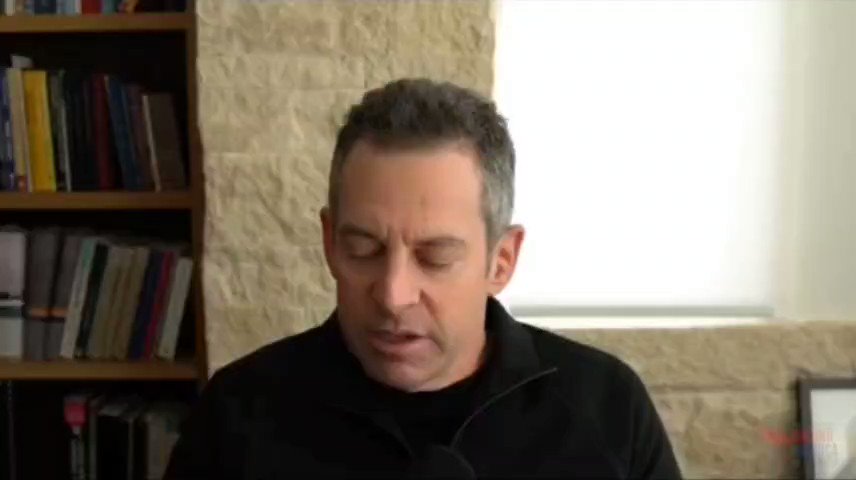Green Eggs and Hamfisted
Public intellectualism once involved a degree of humility. Now it is too often hubris all the way down
If you haven’t yet encountered it, here’s the new orthodoxy on vaccine hesitancy from self-styled public intellectuals Sam Harris and Scott Adams (paraphrased): the science as it unfolded suggested that the vaccine hesitant had no valid rational basis for that hesitancy; while those who promoted mandates were wrong only accidentally, given that they were basing their position on the science as it had been reported to them by those most credentialed to do so.

For instance: Harris argues that had certain pandemic variables been changed, no room for a debate on vaccination programs would have been allowed — and that under those hypothetical circumstances his would-be authoritarianism would have been perfectly justified, while others’ hesitancy would have been rightly demonized, and their cooperation in a mandatory vaccination regime properly and morally commanded by force.
In fact, in his latest attempt to rehabilitate himself as a serious intellectual (rather than a cut-rate Foucault rationalizing his own will to power), Harris argues “in some sense we got unlucky at how benign [the Covid pandemic] was" — noting that, had C19 been much worse, or had it been more deadly in children, we’d all have accepted the necessity of mandatory vaccination, which would justly create a public space in which the government, the media, and big tech were using the censoring of “misinformation” altruistically and properly: the greater good, in such a case, outweighs the individualistic (and, it is implied, narcissistic) desire for bodily autonomy. Thus, Harris concludes, he was not just correct to call for a cessation of individual liberty, given his re-imagined scenario, but he is heroic and brave for doing so un-apologetically.
In addition to being a slippery bit of self-serving sophistry — “if my aunt had a sack and a shaft she’d be my uncle, so I was right all along when I kept calling her ‘sir’” — what Harris and Adams both bracket (and they do so intentionally, it is clear to me, because their outsized egos cannot allow that they were anything but correct, or that had not those who were accidentally correct been available for comparison, we’d all be acknowledging their perspicacity) is both obvious and, ultimately, dispositive in favor of their opponents: that there absolutely is reason to be suspicious of such a coordinated global campaign to put “a needle in every arm”; that there absolutely is reason to consider that institutional capture is both real and pervasive in the pharmacological and medical fields, and that the manufactured consent that often surrounds it provides its only defense; that it is entirely rational to dismiss claims of safety and efficacy in the absence of any data supporting those claims, especially given the novelty of the therapeutic on offer and its prior history of failure in animal trials; that it is absolutely legitimate to question the degree to which governments, global bureaucracies, NGOs, the media, and big tech were working together to solidify a singular Covid narrative; and finally that, after a year of Covid, we could absolutely already see the demographic breakdown of the at-risk population, even if that meant having to use data from other countries, making conclusions drawn from such data entirely pertinent to any ongoing debate about medical and social process.
The position Harris and Adams hold is at root that accepting uncritically (or to the extent criticism is deemed valid) the “expert” scientific consensus in a potential doomsday emergency is both required and righteous —making those who do not do so outliers whose arguments hold no persuasive weight; and that because the data refuting a worse case scenario wasn’t immediately available except through limited observational studies and anecdotal evidence, the proper position to take was to act as if the worse case scenario were indeed taking place, and that the “experts” were entirely unbiased and had no incentive other than the reliable interpretation of data to reach particular set of conclusions.
Except that they did have incentives to reach certain conclusion. Hospitals most certainly and provably were incentivized to diagnose Covid; to admit people based upon that diagnosis; to treat the virus in a way that was institutionally enforced; to secure a course of treatment using Remdesivir; to ventilate patients; and to reject — and demonize — any care that didn’t pursue this specific course of treatment. So it was not “accidental” that some people saw this early on. Similarly, it was not an accident that some people early on determined that the long history of acquired immunity’s providing protection against a virus wasn’t all of a sudden scientifically untenable simply because Anthony Fauci began insisting it was. That’s not how science works. So when public health agencies and their experts must literally change an established definition to create the conditions for a therapeutic to continue its claim to “vaccine,” one would be entirely negligent to dismiss such linguistic maneuvers as innocuous, or their purveyors as well intentioned. And yet that’s exactly what so many self-styled public intellectuals did.
In this case, both Harris and Adams fell for the Eric Stratton gambit (“You fucked up! You trusted us!”), and they simply cannot accept that anyone without their public plaudits and claims to genius could have rationally rejected the credentialed narrative, save by pure blind luck. If the unwashed, conspiratorially-minded anti-vaxxers somehow got it right this time, the argument goes, they did so not by distrusting this particular science, but rather by adopting a conspiratorially-minded worldview that in random instances may align with reality as it comes to be revealed later on. Whereas those with Big Brains, while they may have gotten this one wrong, did so only because they used the best evidence available to them to reach their initial conclusions. They were wrong only because their process was both correct and unimpeachable!
Not only is this affected argument presumptuous (and not a little elitist ), but worse still, it’s just plain wrong. Plenty of credentialed experts who were being deplatformed and silenced by the government / media / big tech fascist troika sounded the alarm early on about a campaign of mass vaccination: vaccinating into an active pandemic is bound to give those mutated variants that resist the vaccine an evolutionary advantage toward dominance, prolonging the pandemic; that repetitive vaccinations — boosters — could lead to immune exhaustion or even antibody-dependent enhancement; and that within the mRNA program itself, unproven in humans and at best unreliable in laboratory animals, plenty of viable potentialities — many of them negative — needed to be examined, especially given the very early signal of serious adverse reactions to the shots, be they cardiac or neurological. Covid didn’t occur in a vacuum. Historically, our health agencies have established certain benchmarks for vaccine harm that would require a specific product to be halted and removed from the market. In this case, those previous benchmarks were ignored — and those who pointed to them demonized as anti-science.
In short, both Harris and Adams have nestled themselves into the welcoming folds of the Tom Nichols Fallacy: credentialed experts often know the most about a subject in which they are credentialed, therefore those same credentialed experts are likely to be correct in their assessment of anything that falls within the purview of their credentialed field.
Not only is this often not the case — credentialism often breeds complacency, and will rely upon the credential to stand in for any real intimate knowledge — but it doesn’t account for the social pressures applied to the assertion: to wit, the way to form consensus is to rally together the credentialed and present them as an impregnable epistemological force, even as we know the reason for the rallying is to present the facade of consensus in the first place. Too, we recognize that for many of those credentialed “experts,” failure to join with the consensus may lead to the loss of the credential and both personal and professional ostracism.
As Mitch Hedberg once noted, “every book is a children’s book, if the kid can read.” A comic’s quip, sure, but one filled with a profound insight about the nature of meritocracy. To those who were able to read studies on their own, or even have them filtered through credentialed experts whom they’d come to trust, nothing being revealed today relating to the inefficiency of the Covid vaccines, their potential (current) adverse effects, and their potential future long term effects, is new, surprising, or “accidentally” understood. In fact, those are the people who predicted every step of the way how this pandemic would resolve itself.
Thus, to dismiss as simpletons who fell ass-backwards into reality those who argued at length about the potential dangers of Covid policy, from lockdowns to mass vaccination campaigns — while simultaneously noting that it was precisely your failure to recognize such dangers that proves your intellectual bona fides — is not only vulgar, but it is deeply deranged, and malignantly narcissistic.
Sometimes it’s just best to take the L and go back to gulling the rubes you’ve already taken in with your claim to special intellectual gifts or rhetorical insights. Otherwise, some intelligent people who to date have largely ignored you and let stand uncontested your gilded public reputations may start to take notice at the shots you’re firing at them. And once a sophist has been thoroughly unmasked, there’s often no going back.
Related: Damn if I wasn’t on to something here!




"The position Harris and Adams hold is at root that accepting uncritically (or to the extent criticism is deemed valid) the “expert” scientific consensus in a potential doomsday emergency is both required and righteous —making those who do not do so outliers whose arguments hold no persuasive weight ..."
Harris holes his argument at the water line. Summarizing, he asserts that, okay, maybe Bret Weinstein will turn out to be right, but it will only be by chance, while Harris might be wrong, but only in the way that experts occasionally are wrong.
Now, had Harris shown that Weinstein was claiming that, say, vaccines could turn out to be very dangerous because they debuted under the wrong astrological sign, then Harris would have at least part of a point.
But that isn't how it went. I happen to listen to both Dark Horse, and Making Sense.
Weinsteins argument was multi-faceted: we have never successfully controlled an infectious upper respiratory virus; we have never developed a successful vaccine against any corona virus; a non-sterilizing vaccine will provide obvious pathways for new variants; natural immunity is superior to artificial immunity; universal vaccination eliminates a control group; and it requires a great leap of faith to assume the safety of a novel approach to vaccination without anything like the sort of track record previous vaccines have required.
(Bret omitted, but it bears mentioning, that thanks to early natural experiments — cruise ships, aircraft carriers, prisons — we had every reason to believe that the mortality rate for C-19 was not going to be anything like would justify socially coercive measures, and that, in any event they wouldn't do any good.)
Harris completely neglected to address any element of Weinstein's argument, and therefore didn't reach the conclusion that Bret will turn out to be right for very good, knowable at the time, reasons.
And Harris will turn out to be wrong because Harris's opinions are correct because Harris thinks them.
I long ago learned to be skeptical of the 'experts'. Even leaving aside improper motives (greed, animus towards perceived political enemies, etc.) there are ample subconscious pressures to interpret the data in certain ways.
Then there's the fact that vast swathes of the 'experts' are part of organizations/institutions that are explicitly aligned with objectively false ideas, e.g. that a man can call himself a woman, and voila! he's a woman, and all must agree with this. This does not inspire confidence in their pronouncements in other areas.